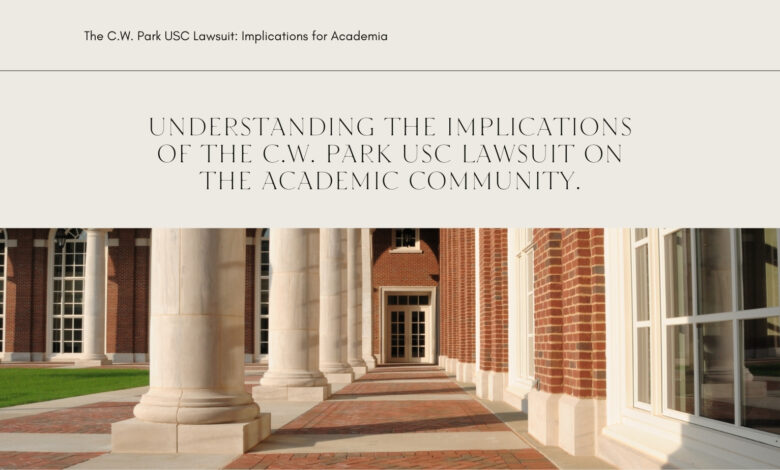Understanding the Impact: Analyzing the C.W. Park USC Lawsuit and Its Implications for the Academic Community

Introduction to the Case
The academic world was shaken when news broke about the lawsuit involving C.W. Park, a prominent figure in the academic community, and the University of Southern California (USC). This legal battle, which has garnered significant attention, is not just a dispute between an individual and an institution; it represents a complex intersection of ethics, academic freedom, and the dynamics of power within educational establishments. To fully grasp the implications of the C.W. Park USC lawsuit, it is essential to delve into the details of the case, understand the key players involved, and comprehend the broader context in which this legal battle is unfolding.
Background of C.W. Park
C.W. Park is a renowned academician, known for his extensive work in the field of marketing and business. His contributions to academic research and his role in shaping young minds have been widely recognized. Before delving into the specifics of the lawsuit, it is crucial to understand Park’s background, his academic journey, and his influence in the world of academia. This context is vital for appreciating the weight of the allegations and the subsequent lawsuit.
The Allegations and the Lawsuit
At the heart of the C.W. Park USC lawsuit are the allegations made against Park. These allegations, which range from ethical misconduct to possible violations of university policy, have serious implications. The lawsuit itself is a complex document, detailing the specific claims made by the university against Park and the legal grounds on which they are based. Analyzing the nature of these allegations and the legal arguments presented by both sides offers a clearer picture of the dispute and its potential consequences.
must raed: Top 10 Best Lion’s Mane Supplements of 2024 A Comprehensive Review and Guide
USC’s Position and Response
The University of Southern California’s stance in this lawsuit is not just a reaction to the allegations against C.W. Park but also reflects the institution’s policies, values, and its approach to handling disputes of this nature. USC’s response, both in legal terms and in its public statements, provides insight into how academic institutions address issues of misconduct and the balance they strive to maintain between upholding ethical standards and protecting their reputation.
Implications for Academic Freedom
One of the critical dimensions of the C.W. Park USC lawsuit is its impact on academic freedom. The case raises important questions about the boundaries of academic expression and the extent to which universities can or should regulate the conduct of their faculty members. This aspect of the lawsuit is particularly significant for the academic community, as it touches upon fundamental principles that govern academic research and teaching.
Reactions from the Academic Community
The reactions to the C.W. Park USC lawsuit from the academic community have been varied and illuminating. These responses reflect the diverse perspectives within academia on issues of ethics, responsibility, and the role of institutions in managing faculty conduct. Examining the range of opinions expressed by academics, researchers, and educational leaders offers a broader understanding of the case’s significance and its potential ripple effects in the academic world.
Legal and Ethical Considerations
At the intersection of the lawsuit are complex legal and ethical considerations. The legal aspects involve understanding the judicial process, the standards of proof required, and the potential outcomes of the case. Ethically, the lawsuit prompts a re-examination of the moral obligations of academics and institutions, challenging preconceived notions about right and wrong in the context of academic endeavors.
Conclusion Looking Ahead
The C.W. Park USC lawsuit is more than a legal battle; it is a case study in the intricate relationship between individual academics and the institutions they are part of. As the case progresses, it will undoubtedly continue to provoke debate and introspection within the academic community. The outcomes of this lawsuit, whether legal, ethical, or reputational, will have lasting implications for how academic institutions navigate similar challenges in the future. In conclusion, the C.W. Park USC lawsuit is not only about the fate of one individual or one university; it is a mirror reflecting the current state and future direction of academia itself.